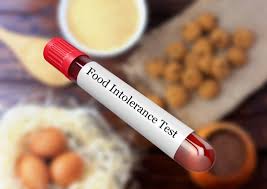One in three people has hidden food intolerances, which often cause unexplained weight gain through fluid retention. If you are one of them, you need to find out what you are intolerant to and which foods to eat instead. You can ‘desensitise’ yourself from foods, which cause intolerance and then re-introduce them three months later (although you cannot do this for foods which cause an IgE / anaphylactic response). You should never eat any food, which causes you to have an allergic response.
A food intolerance is not the same as a food allergy, although some of the symptoms may be similar. In fact, it can be difficult to tell food allergies and food intolerances apart, making it important to speak with your doctor if you suspect you might have an intolerance. When you have a food intolerance, symptoms usually begin within a few hours of eating the food that you are intolerant to. Yet, symptoms can be delayed by up to 48 hours and last for hours or even days, making the offending food especially difficult to pinpoint. What’s more, if you frequently consume foods that you are intolerant to, it may be difficult to correlate symptoms to a specific food. While symptoms of food intolerances vary, they most often involve the digestive system, skin and respiratory system.
Although food intolerances are usually less serious than food allergies, they can negatively affect your quality of life. This is why it’s important to take steps to identify food intolerances in order to prevent unwanted symptoms and health issues.
Improve your gut health and immune system
Your gut is home to 70% of your immune system. You can support your gut health by reducing your “immune load”, and removing ingredients that may be causing it to overwork from your diet.
Discovering whether you’re IntolerantIntolerances can be responsible for many symptoms, especially digestive problems, from bloating to constipation and diarrhoea to abdominal cramps. These are sometimes accompanied by mental and physical symptoms, such as mood changes, chronic tiredness, depression, increased appetite, sleepiness after meals, inability to concentrate and a host of minor ailments from itches and rashes to asthma and sinus problems.
Top common food intolerances
Cow’s Milk
Yeast
Eggs
Wheat
Gluten
Your instant food intolerance check:
If you answer ‘yes’ to four or more of the questions, it is very possible that you may be reacting to certain foods.
- Can you gain weight in hours?
- Do you get bloated after eating?
- Do you suffer from diarrhoea or constipation?
- Do you suffer from abdominal pain?
- Do you sometimes get really sleepy after eating?
- Do you suffer from hay fever?
- Do you suffer from rashes, itches, asthma or shortness of breath?
- Do you suffer from water retention?
- Do you suffer from headaches?
- Do you suffer from other aches or pains, from time to time? – possibly after certain foods?
- Do you get better on holidays abroad, when your diet is completely different?
Food Intolerance Testing
The best way to find out what you are intolerant to is to have a quantitative IgG test. ‘Quantitative’ means the test shows not only whether you are intolerant, but also how strong your reaction is. Many of us live quite healthily with minor food intolerances, but stronger ones can create all sorts of problems, especially weight gain. Home test kits for food intolerances are available or speak to your Health Practitioner for more information.










